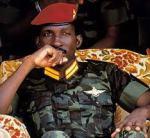By Michael Mungai
“The recent sensation about Joseph Kony should be a lesson to all Africans that if we don’t select the narratives that we would like to universalize, someone else will. And we won’t like it.”

Thomas Sankara, the charismatic and pan-Africanist Burkinabe leader.
True heroes of Africa often lie in unmarked graves. Their achievements are only celebrated by a minority of dissidents who are sparsely located around the continent and throughout its diaspora. Stifled by the fabricated feats of the African neo-colonialist aristocracy, the legacy left by our unsung heroes is more endangered than the mountain gorilla.
The African press expediently exhumes their contributions during national holidays, only to bury them again once the celebrations are over. The global media is fixated on despots and warlords. The recent sensation about Joseph Kony should be a lesson to all Africans that if we don’t select the narratives that we would like to universalize, someone else will. And we won’t like it.
Thomas Sankara may not be a household name, yet to many Africans, he was a leader almost of equal stature to Nelson Mandela and Kwame Nkrumah. Born in 1949 in a country formerly known as Upper Volta, Sankara embarked on a military career, quickly rising in the ranks. Sankara became his country’s head of state in 1983 after leading a coup d’état against the then current government. He renamed his country Burkina Faso, meaning “Land of Upright People.”
For a man referred to as “The African Che Guevara,” it is no surprise that he is still widely unknown in the West. Profoundly influenced by the work of Karl Marx and Vladimir Lenin, he committed his presidency to eradicating poverty and to uplifting the common man. As a Pan- Africanist, he sought to end the political ventriloquism practiced by former African colonial rulers as well as the continent’s dependency on foreign aid. “He who feeds you, controls you”, he argued.
A leader ahead of his time, Sankara was also dedicated to seeing the status of women in his country improve. Under his government, female genital mutilation, polygamy, forced marriages, and other practices that undermine the dignity of women were discouraged and banned. He became the first African head of state to elevate women to multiple top government positions, as well as recruiting them in the army.
A frugal man, Sankara sold off the government’s fleet of Mercedes vehicles, making the Renault 5, the cheapest car available in the country at the time, the official vehicle for his ministers. He reduced his own salary to $450 a month plus his personal possessions. He also banned the use of government chauffeurs and first class airline tickets by his government officials. He encouraged the Burkinabe to purchase garments produced by their fellow countrymen. Sankara also refused air conditioning in his office, arguing that most of his fellow countrymen lived without such luxuries.
His other achievements include policies to fight corruption, environmental protection and reforestation of the Sahel, promotion of education and health, agricultural sustainability, and land redistribution. A charismatic Marxist revolutionary who was a thorn in the flesh of former colonial powers, it was Sankara’s outspoken anti-imperialism that got him killed in 1987. He left office the way he came, through a coup d’état masterminded by his former close ally, Blaise Compaoré, who was backed by the French. He died during the coup, at the age of 38.
Sankara’s fate is not unusual in Africa. Patrice Lumumba, another revolutionary politician from the Democratic Republic of Congo, was also executed in 1961 by the agents of imperialism in his country. Feared to be a communist due to his pan -Africanism as well as his association with the Soviet Union, the Belgian and American governments allegedly played a key role in his assassination. Sankara and Lumumba join the long list of martyrs and heroes of African post-colonial struggle for independence. As Africans, we reward their sacrifices with indifference and disregard to maintaining these narratives. Yet we are always quick to cry foul at the slightest hint of misrepresentation.
With leaders of such caliber, why should Africans allow their heritage to remain unacknowledged when the continent is afflicted by corrupt and self-serving leaders? Why should we allow ourselves to be defined by the worst amongst us? Should we continue to stand in apathy while Africans like Sankara and Lumumba are dismissed and assassinated as communists by the imperial powers which gave us tyrants like Mobutu Sese Seko as the capitalist alternatives? “Until lions have their historians, tales of the hunt shall always glorify the hunters,” says a West African proverb. We need to start telling our own story. Sankara and Lumumba are the type of Africans we should make famous, lest machete-wielding rebels and child kidnappers take their place.
Source: The Huffington Post
